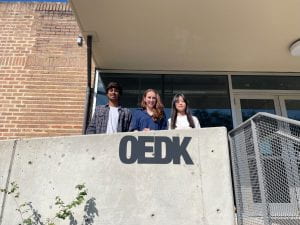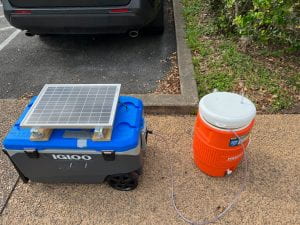I’m Emily Yao, a rising sophomore at Rice from Houston, Texas. I plan on majoring in mechanical engineering with a minor in Engineering Design, as I am interested in the concept of product design and user experience. I’m really excited to take part in the Rice360/SEED internship to gain more experience in building interpersonal relationships, develop prototyping skills and knowledge in design, and explore how all these areas can work together to make an impact on global health.
 .
. 
First week:
This past week was a busy first week but also full of excitement and learning opportunities for me. On the first day, I enjoyed getting to know everyone and learning about all the different projects during the project fair. The two projects that most interested me were the smart helmet for Office of Naval Research and EPIWATER automatic wastewater sampler for COVID-19 Surveillance in NIgeria. For the smart helmet project, the idea of developing a haptic feedback system that can detect environmental threats and assess user health and cognitive function intrigued me. For the EPIWATER project, I was interested in the user-experience aspect of the project, where the team would need to develop an intuitive user interface for the device. I wanted to learn more about the functions and parts of the current prototype, such as the Arduino code, circuitry, and peristaltic pump, and I wanted to possibly have the opportunity to bring a prototype to its finish line this summer. When the results of the project selection came out, I was excited to be placed in the EPIWATER project. In the future, though, I also hope to be able to engage in some research relating to haptics.
On the second day, I had fun getting to know my teammates Esther and Ajay and beginning our work on the project. During the rest of the week, we worked on gaining a deeper understanding of the context of our problem. For a while, we felt a little stuck as to where to start, since we had emailed our client to schedule an interview to gather information but received no response. We also had access to EPIWATER’s prototype, but we had no idea how to operate the device without having previous documentation about it. However, in that moment, we decided to contact a few members of the EPIWATER team, who ended up responding within less than ten minutes! They shared their past project drive with us, and we instantly had a plethora of data to explore. The fact that the team members responded in such a timely manner made me think that I want to be just like that in the future, being able to quickly respond and help others.
With EPIWATER’s drive, we were able to access an overview of how their device works, so we decided to test the device according to our knowledge of how to operate it. When we tested it, however, there were a few unexpected situations and questions that came up, so we plan on asking the team more about it next week. Later during the week, we had our client interview, which gave us a much better understanding of the expectations of the device, how it will be deployed in Nigeria, and the end users of the product. We already spent a lot of time looking over the files of the previous team this week, but there is so much more to learn and understand that we need to continue exploring moving forward.
Additionally, throughout the week there were a couple of workshops, including design workshops and a handtools workshop. For the design workshops, one particular topic that stood out to me was the idea of data gaps in the process of understanding the problem and context. Another important idea was remembering to keep a focus on the end user in mind while brainstorming solutions. I thought that these ideas really emphasized the importance of fully understanding a problem before jumping to conclusions, as generating a solution without a proper foundation can consequently lead to solutions that do not even work to solve the original problem. For the handtools workshop, although I had already done one during my ENGI 120 experience, I enjoyed getting a refresher on how to use each tool effectively.
Overall, it was a tiring but great week; I learned so much and met so many new people, and I am looking forward to having a restful weekend and diving back into work next week!
Goals:
Some goals that I want to achieve during this summer internship include:
- Improving my oral communication and social skills through networking and interacting with more people
- Learning basic prototyping skills including breadboarding, soldering, coding Arduinos, 3D-printing, etc. (specifically gaining more knowledge in Arduino code)
- Really looking forward to learning and improving my ability to CAD!
- Improving my visual design skills (in designing a visual user manual for the automatic wastewater sampler device)
- Finalizing and preparing the automatic wastewater sampler prototype for deployment in Nigeria!
Looking forward to the next few weeks of SEED!
